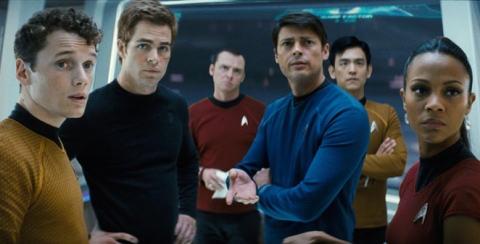
This is what we think about when we hear the term “space opera”
sciencefiction.com
Having finished Zima Blue, a collection of short stories by Alastair Reynolds a few weeks ago, this passage in the introduction gave me food for thought:
… there are plenty of American writers who, like the Brits [list of names provided] have been engaged in reinventing and refurbishing space opera’s cherished but almost fatally tarnished and rusted tropes. In short, the New Space Opera is more of a confluence than a movement: a wide range of writers working on a broad spectrum of themes without the benefit of either a prophet or a manifesto.
I never thought of “New Space Opera” as being a confluence or a movement: to me it was simply a rebirth, an evangelisation of space opera and perhaps an attempt to take it to a more discerning readership when the technobabble and low-brow ideals of Star Trek had become the yardstick. I never thought of Reynolds or Hamilton as being Space Opera because to me they were writers of what we call hard science fiction. I tended to think of Ken MacLeod and Iain M. Banks as part of modern space opera and definitely not part of any movement, deliberate or otherwise and because of their different approaches I would never have lumped those four authors in together.
Let’s go to that eternal resource wiki for clarification:
According to author Paul J. McAuley, a number of mostly British writers began to reinvent space opera in the 1970s[10] (although most non-British critics tend to dispute the British claim to dominance in the new space opera arena[1]). Significant events in this process include the publication of M. John Harrison’s The Centauri Device in 1975 and a “call to arms” editorial by David Pringle and Colin Greenland in the Summer 1984 issue of Interzone; … This “new space opera”, which evolved around the same time cyberpunk emerged and was influenced by it, is darker, moves away from the “triumph of mankind” template of space opera, involves newer technologies, and has stronger characterization than the space opera of old. While it does retain the interstellar scale and scope of traditional space opera, it can also be scientifically rigorous.

Star Trek came to typify what we saw as conventional space opera in the 1960s
trekmovie.com
Pause there… so it was an attempt to inject good science and a dose of gritty realism into galaxy-spanning environments? Ok… carry on.
The new space opera was a reaction against the old. New space opera proponents claim that the genre centers on character development, fine writing, high literary standards, verisimilitude, and a moral exploration of contemporary social issues. McAuley and Michael Levy[11] identify Iain M. Banks, Stephen Baxter, M. John Harrison, Alastair Reynolds, McAuley himself,[10] Ken MacLeod, Peter F. Hamilton and Justina Robson as the most notable practitioners of the new space opera.
This passage make it seem deliberate which contrasts Paul McAuley’s statement that it was more of an accidental or organic coming together of a new wave of science fiction writers who were more science savvy than some of their predecessors, those who saw Asimov and not Lucas as a yardstick. So we have a clear definition: it is space opera that handles far more human issues, ethics, science and technology and how they will impact human existence. It is rarely about triumph of the human spirit above adversity but more about muddling along very much with the same sort of problems but being presented with new problems with the paradigm shifts of any kind of advancement. That sounds fair enough.
But is it really that different? to what extent is it being put in a box? Is it a movement, a confluence or a happy medium between the hard science fiction of Asimov and the shut-your-brain-off-and-watch-the-explosions space opera of that era? The disdain of Old Space Opera is no better demonstrated than in this review of the aptly entitled “New Space Opera” and it accuses some of the works in that volume of being something that no space opera should ever be: dull. There seems to be then, a deliberate separation of this new space opera from the old “guilty pleasure” of the old space opera. The old was all about explosions, wars, evil empires battling good rebels, probably a few cute robots, tall dark and handsome heroes with equally beautiful love interests. New Space Opera is the setting but focussing on the science, the big ideas. Old Space Opera is the 1970s Battlestar Galactica, New Space Opera is the new Battlestar Galactica.
Finally, I want to come back to a point about New Space Opera being a British phenomena. Certainly the big names of the sub-genre are heavily weighted in favour of this sceptred isle: Aldiss, Harrison, McAuley, MacLeod, Reynolds, Baxter, Hamilton, Banks, Robson. Off the top of my head I can think of only one American author who would fit that tradition: Robert Reed and I find his work has a very British style of writing.
If anybody could shed any light on this, especially why the biggest names in New Space Opera are all British, please feel free to add to the discussion.


























